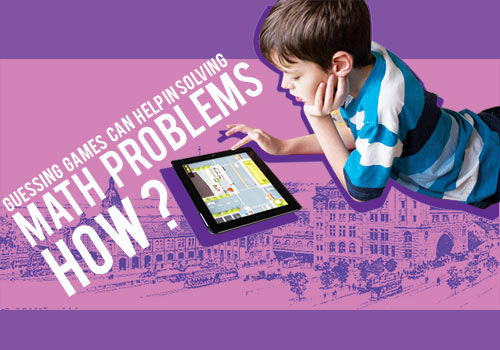Categories(658 Blogs)
Select Category
Watch Right Now
Teacher App - Class
Schedule & Attendance Management App
Parent App from Edsys

Best School Bus Tracking System

Cashless School - For Smart Schools of Tomorrow


Guessing Games Can Help in Solving Math Problems. How?

You as a parent must have noticed the difficulty your child has with numbers while he is so good at reading and writing English. He might even find it difficult to perform simple mathematical functions like additions and subtractions. Helping such kids, guessing games come as interesting and fun-filled options to master the seemingly complicated subject of numbers and figures.
Boost your Math skills with FREE Math Apps (Check it Now)
For all such kids who are confused about numbers, here are the numerous ways in which guessing games can help them feel comfortable with numbers.
- Intuition Plays A Significant Role
Primarily aimed at eliminating the math phobia of your kid, you can introduce him/her to a guessing game. As a part of the game, he should be prompted to guess the number of items in a set of objects without actually counting them one-by-one. This intuitive manner of arriving at the right number helps your kid perform better with numbers.
- Start Small and Leap Ahead
While you have identified the basic issue with your kid in case of numbers, he might surprise you, by beating you in a game of chess. Chess is an intuitive and intelligent game that sharpens the imagination of your kid to base his next move by imagining your next move with your chess pawns. Guessing games help your kid to think about numbers, their approximations and various combinations. You can start off with simple numerical exercises and then move on to solving complicated math problems.
- Reasoning Skills Are Sharpened
A proper workout to the brain can be ensured through guessing games. These fun-filled, educative games come with plenty of interactive activities which makes math learning exciting. A host of number problem games can put your kid’s logical thinking to test. They can also handhold your kid to sharpen his reasoning skills as well.
- Math is All Around You
When you look around, you will find a host of natural objects that can teach your kid the significance of shapes and sizes. A yellow flower with 5 petals looks so different from a rose with multiple petals. If you can coax your kid to appreciate the various objects in nature and their innate differences and similarities, your kid can get over his fear of numbers naturally.
- Inculcates a Positive Learning Environment
With guessing games, you can sharpen the math skills of your kid in the midst of a safe and engaging environment. These games which come a host of in-built contests can help your kid stretch his imagination and tide over those numerical challenges. And once your child begins to excel in intuitive math tasks, you can find an evident improvement in his math grades in school.
- Numbers Speak for Themselves
Research conducted on two group of students; one which was subjected to intuitive math tasks and the other which followed the controlled task procedure demonstrate a positive response in terms of guessing games. Researchers concluded that the group which was exposed to guessing games registered a 25% improvement in terms of better understanding and faster grasp of mathematical concepts when compared to the other group which focused entirely on controlled tasks.
- A Strong Foundation to Math Fundamentals
Bookish information at times fails to lay a strong foundation of mathematical concepts. In such cases, it is through guessing games that students can polish their math fundamentals. They begin to comprehend the reason behind a particular mathematical rule or axiom. Such games ignite the creative senses of your child who will start loving the mental exercises; without simply memorising mathematical postulates.
- Mental Math Games
A special mention goes out to the prominence of mental math games which can become instruments of teaching your kid mathematical problem-solving skills. Repeated practice is possible when questions keep changing over and over again. Without any time restrictions to arrive at a right answer, you can gain brownie points provided if you are quick with your answers.
- A Practical Approach To Deal With Numbers and Shapes
When you as a parent encourage your children to look at math in a practical way, you will be reinforcing their problem-solving skills. Prompt them to think about numbers by applying real-world scenarios and you will not only strengthen their math skills but will also pave the way for a creative bent of mind.
- Guessing Is Not the Be-All-End-All of Mastering Math
With a strong sense of conviction, you as a parent know and believe that guessing random numbers for every math question your kid finds in his/her textbooks is not the right practice. However, there are instances which signify the prominence of educated guesses. Such well-informed guesses can be of utmost use to your kids. They will help your child come up with the right estimate which need not stem from a random guess. Since your kid is extending effort in the direction of making an accurate guess, he will be close to the right answer which will lead to an exciting means to estimate numbers.
- Allows Kids the Luxury of Making Mistakes and Learn From Them
With guessing games, your child will begin to understand that it is perfectly fine to make mistakes. He will also appreciate the fact that he should not expect the correct answer in the very first attempt. He will acclimatize himself with the trial-and-error method and will rule out the guesses that have taken him further away from the solution and will incorporate the closer guess that will provide him with the right answer. By following this strategy, your kids will sharpen their logical thinking as well.
- The Universal Ideology Behind “Guess and Check”
Named as a promising problem-solving strategy that can be applied to guessing games, students who adhere to the “guess and check” principle will be able to solve math problems by initially guessing the answer. Then they check to see whether the guess matches all the predefined conditions of the problem. They will then refine the guess to come closer to the solution. This is a famous ideology that has churned out many research mathematicians when they guess a possible solution to a math equation and then try to prove it with a valid condition called as “Proof”.
Boost your Math skills with FREE Math Apps (Check it Now)
Closing Thoughts
The study of numbers and figures can indeed be a difficult task for students. But with guessing games, you as a parent will be encouraging your children to look at math through a pair of practical eyes. This way, your children will enjoy learning math as an exciting and stimulating part of their daily routine.
Recent Blogs
Our Educational Services
Popular Blogs
Subscribe

SUBSCRIBE TO OUR NEWSLETTER
Sign Up and Recieve the Latest News
Don’t Worry, We Don’t SpamExplore Our Extensive Researched Educational App Directory
Visit Now














